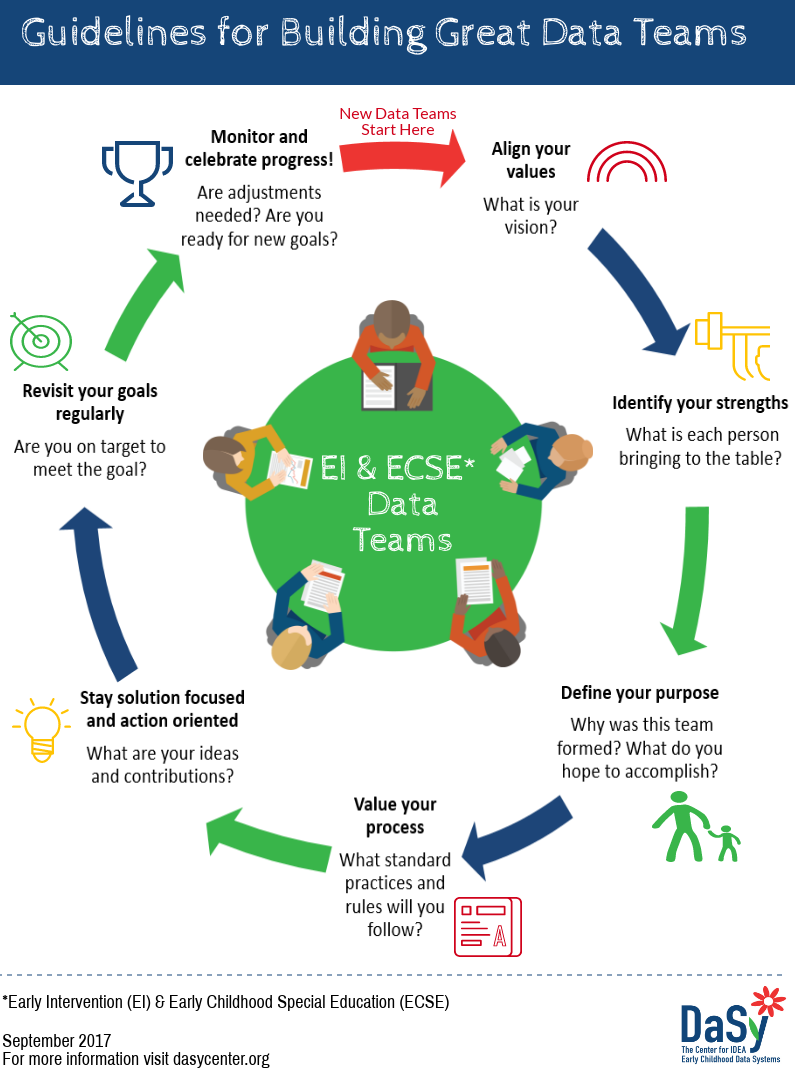The process of creating and maintaining an effective data team is continuous and cyclical. Existing data teams may be at different places in the cycle. However, if you are creating a new data team, begin with aligning your values.
Regardless of your approach to your data team (internal or external), the infographic below, set in a continuous cycle format, contains the essential elements for building an effective data team and can be used to support discussion about the approach to your data team.
Download Guidelines for Building Great Data Teams Infographic or text-only version.

Talking Points: Guidelines for Creating Great Data Teams
When being initially formed and periodically thereafter, it is important for data teams (internal and external) to:
- Align your values. Discuss your vision for the group. Work on ensuring that all team members share a common vision for your work together and that it aligns with your program’s purpose and vision. As the group finishes tasks and starts new ones, discuss values again. This will help keep the group working in a manner that is aligned to your group’s vision.
- Identify your strengths. Each person joins with a unique set of skills and knowledge. Learn each other’s strengths and rely on them to complete the work.
- Define your purpose. Take time to ensure that all group members agree on the team’s purpose. Why was it formed (e.g., to seek answers to identified critical questions)? If relying on an existing team to serve this function, what purpose will the external data serve? Does the original purpose still apply? Has the purpose been accomplished? Is the team ready to move to something new? Is it time for a new team to step in?
- Value your process. For internal data teams, give a clear process for when and how the team meets by establishing at the outset a meeting schedule and meeting practices and rules. An example of a practice might be to take the first 5 minutes of every meeting for members to write down frustrations, celebrations, and aspirations and then take a few minutes to share them. Establish meeting rules such as rotating note takers, time keepers, and basics such as turn-taking. For external teams with multiple purposes beyond the specific data issues addressed by this team, establish a standing agenda item to review/discuss data team-related items.
- Stay solution focused and action oriented. Focus on action-oriented tasks and resist the temptation to discuss a problem endlessly without clearly defining it, identifying root causes and possible solutions, and specifying action items aimed at solving the problem. To the maximum extent possible, avoid tangents that will not lead to the accomplishment of goals that have been set.
- Revisit your goals regularly. Set targets to meet your goals. Revisit them regularly to ensure that the data team stays focused and that your goals are still relevant to the team’s purpose, current context, and available data.
- Monitor and celebrate progress! Have you achieved your goals? If so, are you ready for new ones with this team, do new goals need to be set, or does a new data team need to be formed?
Published August 2017.

